
Iran’s permanent representative to the International Atomic Energy Agency (IAEA) issued a biting response to his Israeli counterpart’s claim that Iran and Syria posed “significant proliferation threats” to the Middle East and the world.
Iranian IAEA Ambassador Kazem Gharibabadi urged the international community to pressure Israel to sign onto Nuclear Non-Proliferation Treaty (NTP), saying that doing so would be the only way to bring peace to the Middle East.
Speaking at the 62nd Annual Session of the ongoing IAEA General Conference in Vienna, Gharibabadi charged Israel with threatening its neighbors, pointed to its possession of nuclear weapons, and chastised the IAEA for giving in to Israeli pressure and not following up on what he said were the country’s “dangerous” nuclear activities.
According to the ambassador, little progress has been made on nuclear disarmament, one of the NTP’s major stated objectives, in the fifty years since the treaty was signed. Gharibabadi also pointed to the Middle East Nuclear Weapon Freeze Zone idea, a UN project dating back to 1970s aimed at prohibiting nuclear weapons in the region, and how this proposal too has suffered from a “lack of political will.”
Gharibabadi’s remarks came on the heels of comments at the conference by Israel Atomic Energy Commission chairman Ze’ev Snir, who also called on the international community to take action against alleged Iranian and Syrian nuclear activities. The two countries, he said, “pose significant proliferation threats to the region and the world.” Snir warned about an “outrageous threat” by Iran attack Israeli nuclear sites, and called Tehran a threat to “regional peace and security.” The Israeli ambassador called on the IAEA to conduct a thorough verification of Iran’s activities, saying the country’s nuclear weapons ambitions were “a documented fact.”
Israel, which has a policy of neither admitting or denying the existence of a nuclear weapons program, is presently believed to be the only country in the Middle East to possess nuclear weapons, with estimates that it has anywhere between 80 and 400 warheads deliverable by a variety of air, sub and missile platforms.
Iran, an NPT signatory under observance by the IAEA over compliance with the Joint Comprehensive Plan of Action (JCPOA) nuclear deal, is barred from the creation of nuclear weapons. The fate of the 2015 deal, which was signed by the Iran, the United States, Russia, China, and several European countries, was put into question after Washington withdrew from the deal in May 2018 and vowed to impose unilateral sanctions against the Islamic Republic.
Last month, during a visit to an Israeli nuclear facility, Israeli Prime Minister Benjamin Netanyahu made what has been widely interpreted to have been a veiled warning about Israel’s nuclear capabilities and their possible use if the country was ever attacked. Iranian Foreign Minister called the remarks hypocritical and “beyond shameless.”
Signed in 1968 and stepping into force in 1970, the Nuclear Non-Proliferation Treaty is tasked with preventing the spread of nuclear weapons and furthering the goal of eventual global nuclear disarmament. Under the treaty, Russia, the United States, the United Kingdom, France and China are recognized as nuclear weapons states. Non-signatories include Israel, India, Pakistan and South Sudan. North Korea withdrew from the NPT in 2003.
Sourse: sputniknews.com






